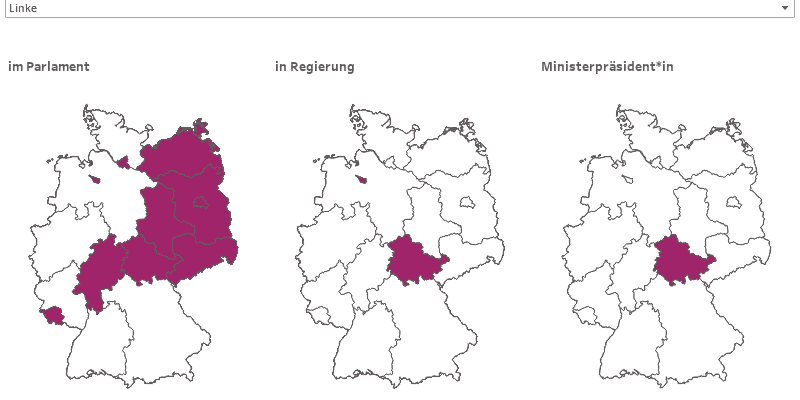Sunday, October 03, 2021
Interview with Katja Kipping
“What did Christian Lindner do better?”
You go out of the federal election as one of the losers: The Left only got 4.9 percent of the votes and only moved into the Bundestag because three leftists were able to get direct mandates. Ex-party leader Kipping says the left now has to “clear up a few misunderstandings”.
ntv.de: The Left suffered a nationwide defeat in the election. Still, is there something that you think went well?
Katja Kipping: What I was personally very happy about as a street election campaigner: In my constituency of Dresden I I managed to get almost twice as many first votes as the party received second votes. I take that as a small, personal success. We also managed to refer Jens Maier from the AfD to third place. Unfortunately, in the end I was two percent short of receiving the direct mandate in Dresden.
The first meeting of the Left Group took place on Tuesday. How was the mood?
We had a largely good debate. It has been said over and over that the way we voted on the Afghanistan mission was a problem. Another point that has often been mentioned: During the election campaign, the wrong impression was created that we are putting the exit from NATO above all important social changes. That was not convincing and caused some irritation. Overall, there was a great effort at the meeting to tackle things together.
What was the left’s biggest problem?
There were several factors, including some external ones, for which we could not help. In February 2020 we were in the polls for weeks at ten, eleven percent. And then came the corona crisis. There was also this Triell election campaign, which was very much focused on the SPD, the Union and the Greens. We didn’t appear in there and that definitely harmed us.
The FDP did not appear in this Triell election campaign either, but it was able to achieve better results.
Yes, that is a point indeed. What does Christian Lindner have as parliamentary group leader and what has the FDP parliamentary group in the Bundestag done differently from us? Why was the FDP parliamentary group able to position itself better than our parliamentary group during the Corona period? We will now have to analyze that. It is expressly not about pointing the blame. But we need to learn the right lessons from this for the future.
Her party leader Susanne Hennig-Wellsow recently said that the left must “reinvent itself”. What should be the priority in this realignment?
We need to clear up a few misunderstandings. If, for example, the impression arises that we want to cooperate with despots, then that damages our credibility on the peace issue. It must be made clear that we are unequivocally in favor of peace and disarmament and against war. It must therefore not appear as if we are measuring this issue with double standards and, with some despots, we are not serious about disarmament and peace policy.
Do these misunderstandings also exist within the party? Some party members give the impression that there is disagreement over the political orientation of the left.
In the practice of the left and in all discussions there is a very broadly shared conviction. For example, we have chosen the new chairmen and the two top candidates Dietmar Bartsch and Janine Wissler by mutual agreement. The election manifesto, too, came about in a very amicable, democratic process. There are a few public voices that have caused public irritation. However, these are not representative of the mood in the party.
Sahra Wagenknecht recently criticized that the Left is in danger “of becoming a party of the largely well-off academic Fridays for Future Milieus to become “. People without academic training or outside the big cities would hardly vote for it anymore. What do you think about that?
Our task as the left is to empower the many who cannot afford lobbyists. And you don’t strengthen the many by playing them off against each other according to socio-cultural characteristics. We have strengthened what we have in common, for example, with a campaign against the shortage of care and for affordable housing – things that bring people of very different origins and socio-cultural backgrounds together.
In this election campaign, the left has also made a strong contribution to climate protection, with some goals that are more ambitious than the Greens have. Did that seem unrealistic and unworkable?
No, that didn’t even arrive. Word has not spread widely that we want to do much more consistent and social climate protection. Many thought: “Okay, the climate is important to me. Then I will put a cross with the Greens.” The fact is: With 1.4 million votes, most of our voters went to the SPD and the Greens. Unfortunately, we were associated with positions such as the exit from NATO and weird voting behavior in Afghanistan – but not with climate justice, as a look at our sobering competence values shows.
With a view to the next legislative period: How much will the left still be able to influence current politics?
We are now in demand in the federal government as the opposition. If the SPD and the Greens should be in the government, we will insist that they keep everything they promised the people in the election campaign. We have to prevent the worst: That we do not make any progress on climate protection and that the costs of the crisis are passed on to the workers and the poor. I see the great danger that in a government with a Union or FDP, there will be tax gifts for the super-rich, but there will be no money for educational equality and climate protection. And that means four more lost years in the fight against social and ecological crises.
Lara Wernig spoke to Katja Kipping
